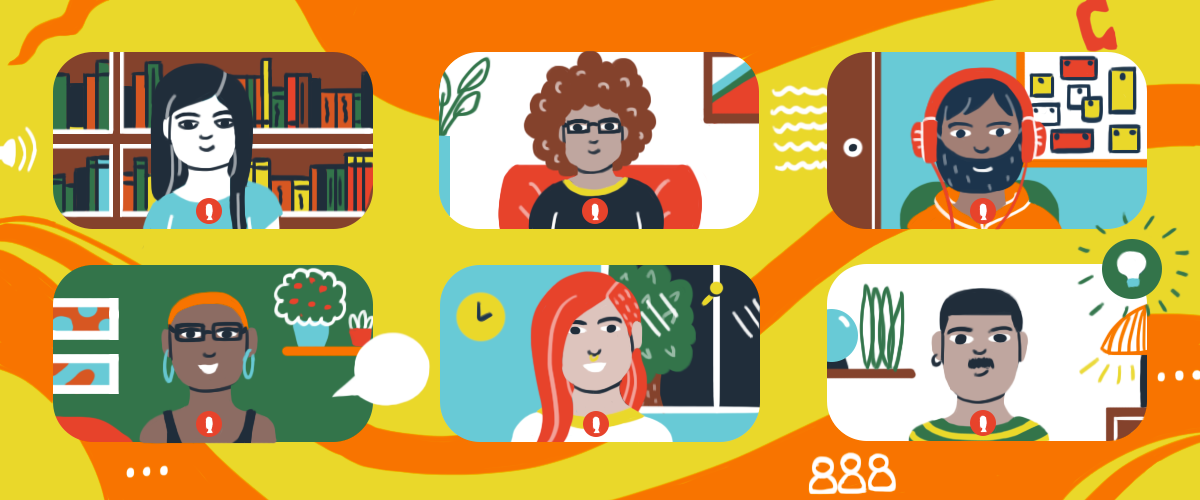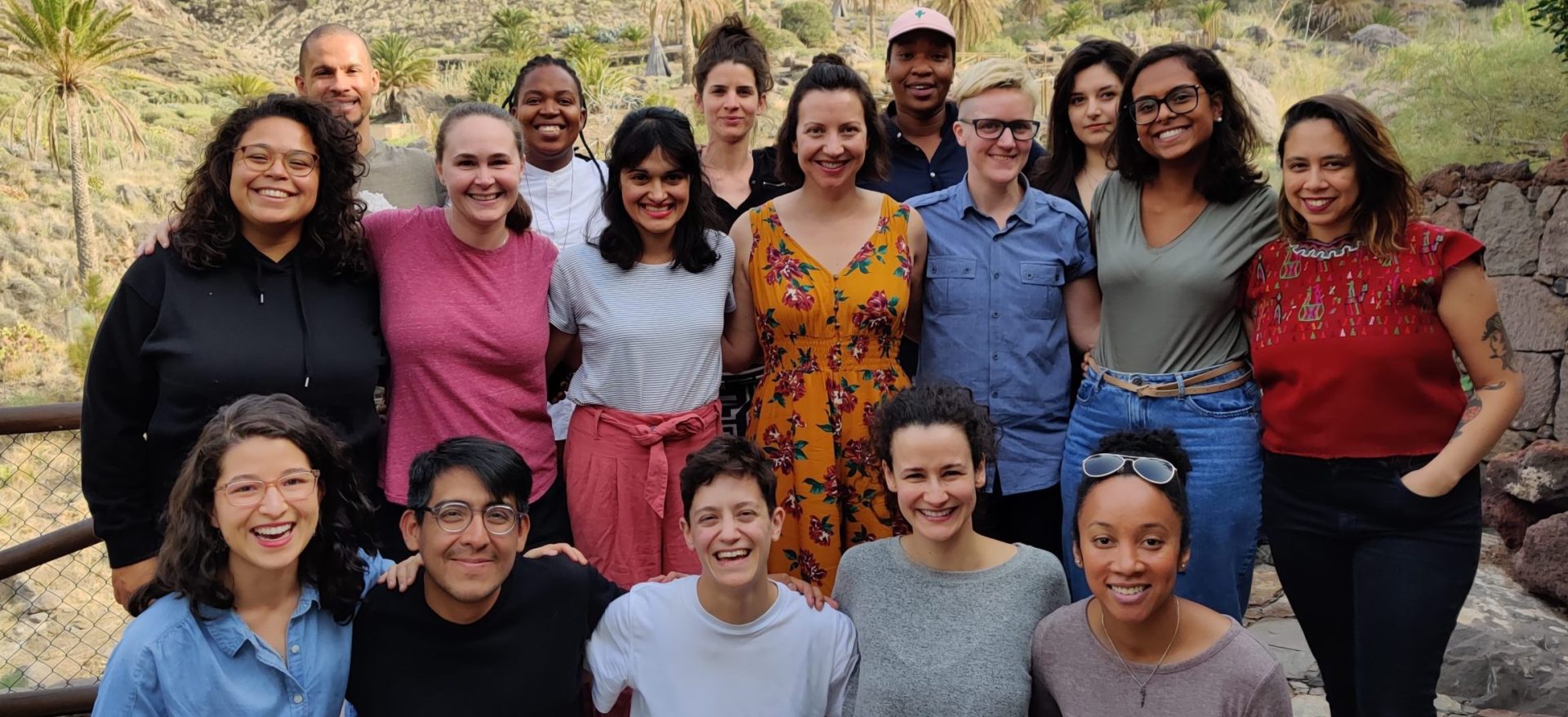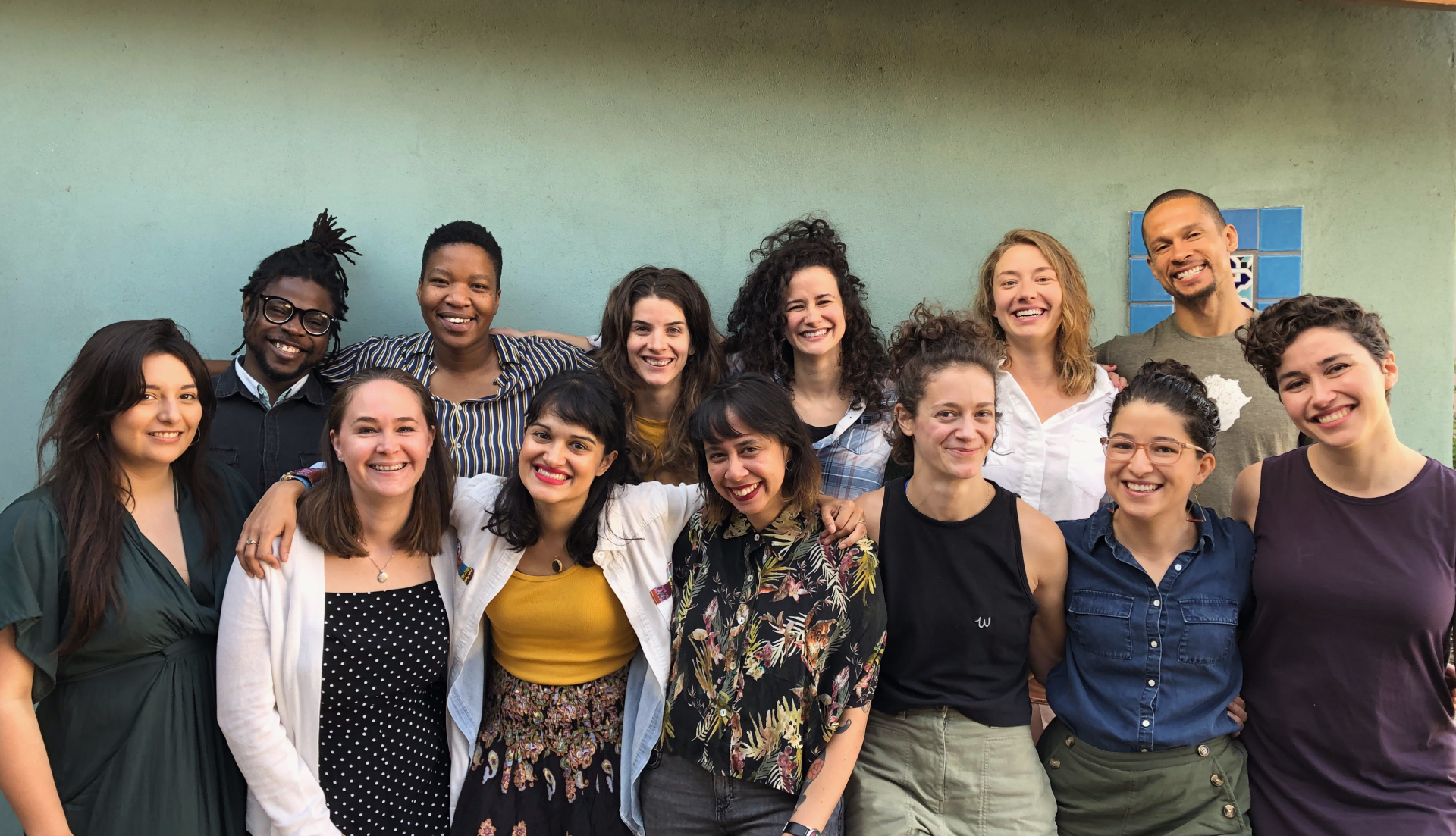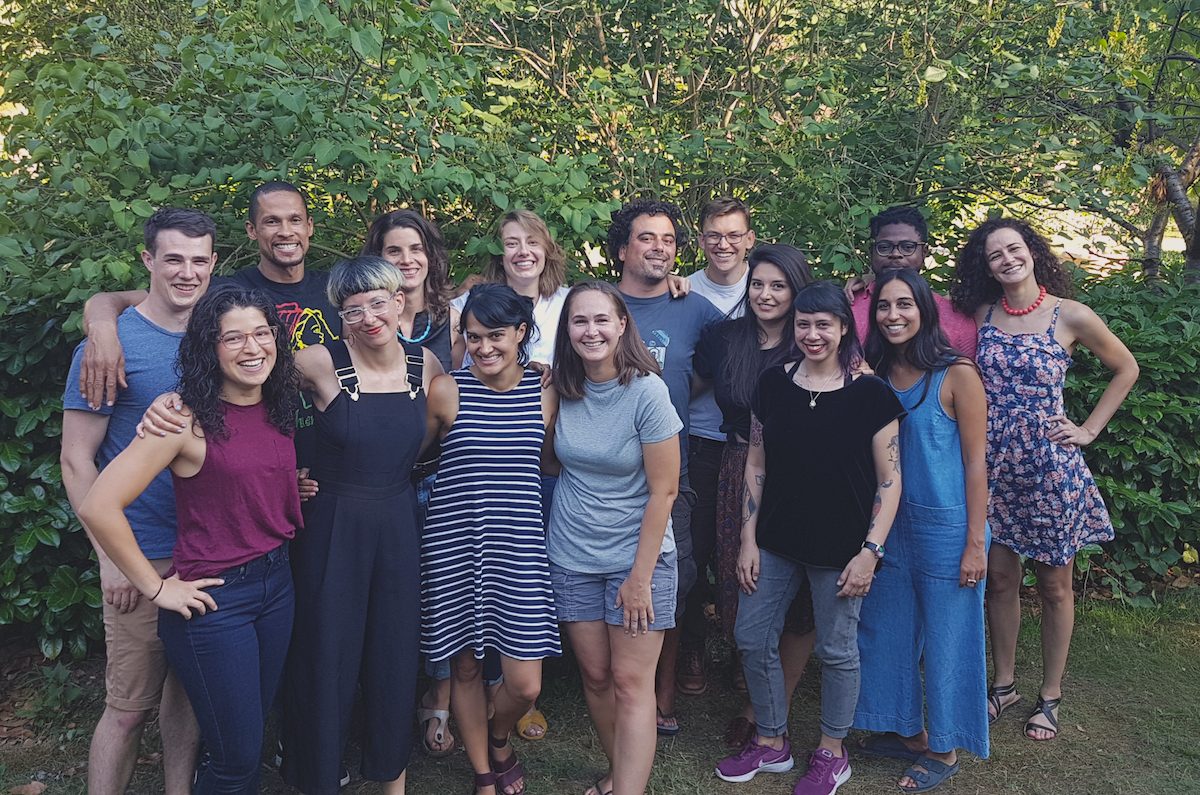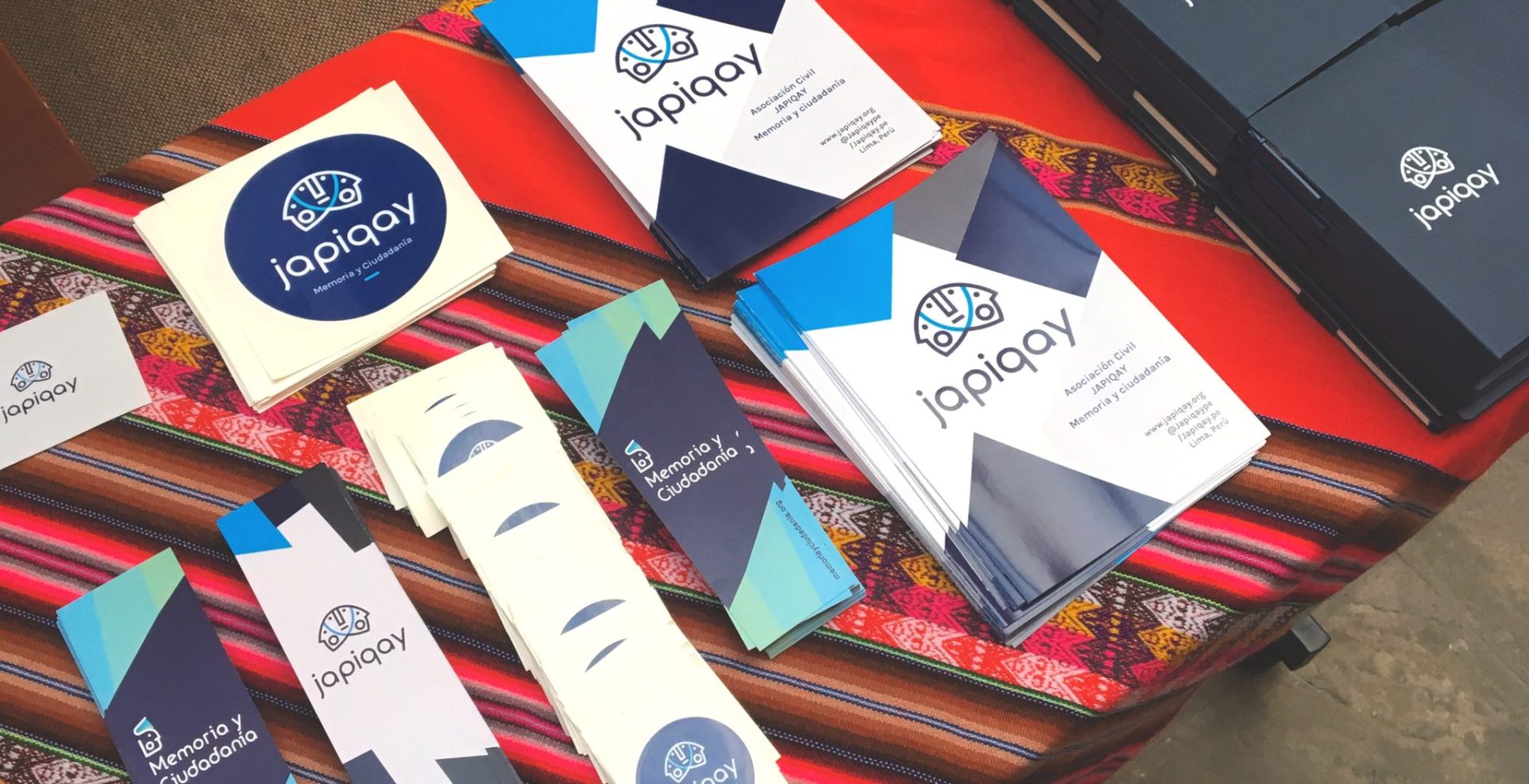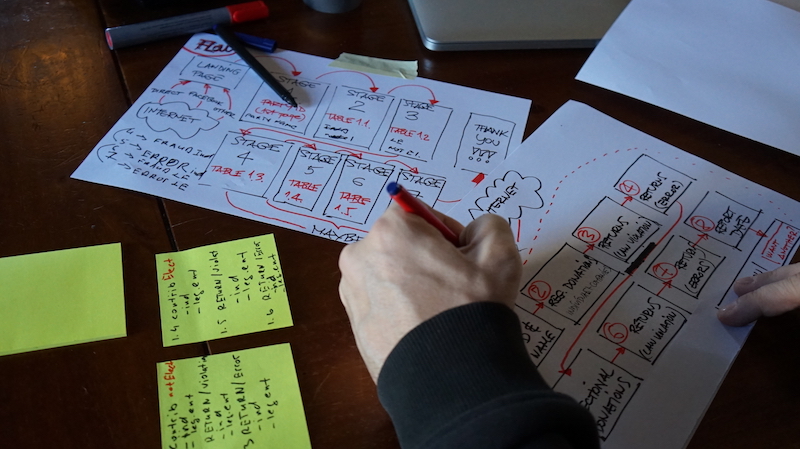Looking back at our partnership with EVA Nigeria
Learnings & Reflections
Wrapping up our first Responsible Data cohort learning programme
We just finished the pilot of our new cohort learning programme, designed to equip social justice leaders with the knowledge and tools needed for implementing responsible data!
The work ahead & extending our strategy
Nearing the end of what was the original end-date of our strategy, we’ve made the decision to extend it for another year, to the end of 2023. More than ever, we need to continue building this strong, resilient and well-networked movement of social justice activists.
Takeaways from our community call on documenting police violence in 2020
We hosted a community call for organisations working on documenting institutional and police violence. Here are key takeaways from the conversation and a list of readings and projects that were shared by the participants.
A justice-based approach to research and learning
We will situate all our key research questions about the intersection of tech, data and civil society within a justice framework that examines or surfaces power dynamics.
Facing corruption with reflection and collaboration
Lee este post en español. Last year, we launched a project to support Latin American organisations in reflecting and learning about how they use data and technology in their projects. As many organisations in the region are operating in environments where transparency, accountability and democracy are threatened, adopting a strategic approach to data and technology is an important […]
Big picture, little stitches at our annual retreat
At the beginning of this month, The Engine Room team–all 17 of us!–met in-person for our annual team retreat. This year, we gathered at the Redondo de Guayedra on Gran Canaria, complete with stunning views and even better weather. This year, we did things a little differently than how we’ve done them in the past. […]
Exploring technology and data project learnings in Latin America
A few months ago we launched a new project to test assumptions, iterate on approaches and measure impact. Here are some lessons we’re learning!
Conserving resources in civic tech
A few months ago, I shared my thoughts on why I believe there is enormous potential in introducing more principled waste management techniques in the civic tech sector. I received valuable feedback on the piece and some clarifying questions, a few of which I thought would be worth sharing and answering.
Theatre for one
*sound on* We’ve curated a collection of our favourite tech + civil society podcasts to brighten up your commute or chore list
Is “going digital” the answer?
Data and technology can help civil society organisations increase their impact. But that doesn’t mean that digital tools are superior to analogue methods.
Responsible by Design
A rights-based approach to designing, implementing and scaling best practices for the use of data could be leveraged beyond the civil society sector.
Digital ID: Where do we go from here?
In this post, we share some thoughts on how civil society could advance our collective advocacy on digital ID systems.
Supporting with humility
At the core of our work is supporting organisations to accelerate their social change and social justice goals by responsibly integrating data and tech into their work. To do this in a sustainable and impactful way, we’ve learned the importance of centring their expertise, style of work and understandings of different contexts.
The art of working remotely
Remote work has unique challenges. Here are some suggestions to help you stay engaged while working from home (or wherever your office is for the day.)
Talking politics, collaboration & the future
In April, The Engine Room team gathered for our 2019 annual retreat, where we would regroup, reconnect, brainstorm and build new paths forward.
Learning when to stop
Within civil society, we can’t control what technology is developed, but we can control how we choose to engage with it.
Responsible waste management in civic tech
Many of us already invest time and resources into minimizing our plastic consumption, reusing paper, or composting our food. But what about the digital waste we create in our work as nonprofits? Human rights defenders, transparency advocates, and many others working for the greater public good repeatedly design technology-heavy projects that cost a lot of […]
For civil society, exploitative data practices never match our mission
This is not about the WFP or Palantir, but about ensuring that exploitative data practices have no place in civil society work, be it through pro bono partnerships, in-house development or paid contracts.
Making space to name our values
Conventional wisdom might dictate that organisational values are something that you design with an executive director in the room, or at the very least in the organisation. Well, we didn’t really do that, or not exactly.
Embracing complexity is a must, not a luxury
In the intersection of technology and social change, diversity means that we need to embrace the inherent complexity that comes from the often dissonant voices and conflicting needs of the sectors we work in. These voices might seem mutually exclusive – sometimes downright contradictory – but they need to be heard and taken seriously.
2018 as we wrote it
At The Engine Room, 2018 was our most prolific blogging year yet, with over 60 posts. As the year draws to a close, we feel gratitude towards all of our external contributors and our dear readers. Take a quick look at some of our – and our readers’ – favorite posts!
There’s more to well-being than free coffee: Building a healthy remote organisation
At The Engine Room, we are an entirely remote team. Since we can’t see our team in-person that often, we design unique ways to check in on and promote each others’ well-being.
What do we know about data for policy reform? Learnings for international civil society
Earlier this year, The Engine Room and ONE partnered to better understand how civil society in Sub-Saharan Africa is using data to achieve policy reform. Our findings have implications for how the international data community supplies data to local actors, expects data to be used, and supports further work with data.
Reflections on Organisational Security Audits
We’ve implemented two security audits in South America to support emerging organisations that are using civic technology to advance social justice. Here, we share some insights developed over the course of this work, and explore how we will put these learnings to use in the future.
Transitions, thoughtful growth and dreaming big: The Engine Room 2018 Retreat
Reflections from our 2018 retreat.
Collaborating to monitor abuse of power: why it matters and how it can be done
In the past few years, Latin America has been hit hard with corruption scandals.The alarming Lava Jato scandal revealed how companies used networks of offshore entities across the region to launder money and fund bribes. In Peru alone, the Odebrecht company confirmed to the US Department of Justice that they made corrupt payments to Peruvian […]
How do we contribute to change? Takeaways from our impact assessment
We recently undertook a two-part plan to assess our impact. Today, we are sharing a Primer on our approach, which summarises our objectives and methodology.
Learnings from the 2008 financial crisis for our 2018 data crisis
What do the two crises have in common? It seems that many of the advocacy and regulatory arguments made around new data protections are eerily similar to the arguments made during the call for regulation of the financial industries.
Shifting Gears at The Engine Room: Why I’m proud of our work, and why it’s time for me to go
Today we are launching a recruitment process for my successor. This post outlines the problem we have worked to solve, our role in solving it, and the ‘why now’ of my transition out of the organisation.
After public service delivery fails, life goes on
Through our Matchbox program we partnered with Code for Sierra Leone to navigate the murky waters of identifying local solutions meeting water service delivery needs in Freetown. Here’s what we found!
Creating a collective memory so history doesn’t repeat itself: Introducing Japiqay
Over the past year and a half, The Engine Room supported the creation of a new organisation and their flagship anti-corruption project. The organisation, Japiqay, grew out of the deep political convictions and intense passion of its three woman co-founders: Gabriela Flores, Lourdes Chavez, and Lia Flores.
Responsible data considerations for sharing human rights data – what do we already know?
This post was written by Tom Walker and Fieke Jansen, with input from Rachel Rank and Lorena Klos. For many human rights funders, communicating clearly about the activities they fund (and why they are valuable) is an important part of their work. Indeed, funders often favour transparency on principle as an inherent good. How can […]
Sharing data responsibly – how and why do human rights funders share data?
We want to understand why funders share data, how they share it, and the challenges they face in doing so responsibly. We’ll be surveying a wide range of people and interviewing funders about their experiences, with the ultimate goal of producing a framework that can help them to make informed decisions.
2017 in Review: This work matters now more than ever
We’re excited to announce the launch of our 2017 Retrospective, where we dive into not just our work, but that of our brilliant partners around the world.
When ‘Keeping Resources Updated’ Means Retirement
We’re retiring The Compiler – not because we think that the mission of it is any less important, but because we think it’s time to focus our energies on other ways of achieving that mission.
Reflections from the Global Voices Summit: on community shifts, equity, and finding our place
Late last year, I attended the Global Voices Summit – an event which brings the Global Voices (GV) community together, uniting individuals from diverse countries, backgrounds, and professions. I’ve been involved with GV for a couple of years, but it was my first Summit, and the first time I got to meet lots of online […]
2017: The Year in Posts
There are countless ways to measure a year, to reflect on work done through meetings held, events convened, research conducted, blog posts written. This year, Engine Roomers — and our guest authors — published 53 posts on topics ranging from transparency in Latin America to digital security among funders. We even had a love letter! […]
Measuring social impact can be hard, but here’s why we are doing it
The Social Impact Dilemma: When measuring support gets complicated. It’s an ever-relevant question for organisations working on social change — how do we know that we are making a difference?
Going beyond ‘do no harm’: Developing data principles with DataKindUK
DataKind UK decided to develop a set of principles to guide their work in a process led by their network of volunteers (in DataKindUK fashion).
Don’t let your parties get out of hand
One big gap in many organisations’ security culture is the use of Slack. In a dream world, we would all have the capacity and resources to manage our own servers and implement an open source alternative. Right now that’s just not realistic for most, so if an organisation needs to use Slack it makes sense to help them use it more intentionally – meeting them where they are – rather than brute-force their switch to a Mattermost server, for example.
Reflections from Africa Open Data Conference 2017
In July 2017, I realised that many of the issues we were discussing at the African Open Data Conference (AODC) were similar to the ones I’d seen in Ghana. These links got me thinking about the importance of sequencing in designing open government initiatives.
Designing for the (not-so-distant) future
If you find yourself in the throes of a redesign, at some point you will need to transform user research into platform mockups. We hope that our approach can help you to zero-in on the goals of the redesign, and make more pragmatic decisions as you move forward.
Panic Button: Lessons for the Tech for Good sector
This post is by Tanya O’Carroll, Adviser Tech and Human Rights, Amnesty International; Danna Ingleton, Adviser, Human Rights Defenders; and Jun Matsushita, Founder and CEO, iilab. Making the decision to cease support for the Panic Button app was not an easy one, but it was also not an empty one. We believe that diving into […]
Panic Button: Why we are retiring the app
This post is by Tanya O’Carroll, Adviser Tech and Human Rights, Amnesty International; Danna Ingleton, Adviser, Human Rights Defenders; and Jun Matsushita, Founder and CEO, iilab. In 2012, Amnesty International, with support from our partners at iilab, The Engine Room and Frontline Defenders, began developing a tool that would provide human rights defenders with an […]
Questions to guide the work of data investigators
Earlier this summer, I spent six days in Montenegro with 60 ‘data investigators’ – or people working on data investigation – from around the Balkans and around the world. At this Data Investigation Camp, hosted by Tactical Tech and Share Lab, our shared goal was to focus on ‘how we can use data to understand and expose misconduct and abuses of power within a human rights, investigative journalism and anti-corruption framework’.
Diversity is a competency
I see diversity not just as the right thing or the politically correct thing to do to avoid being embarrassed by call out culture, but as a core competency of any organisation. Where I see a homogeneous monoculture, I see an organisation that cannot be effective. An all-male management team? In the long run, you have a very slim chance at succeeding, unless your goal is to serve all-male communities.
Takeaways from the Digital Verification Corps Summit
Last week, I had the privilege of spending three days on the Berkeley campus with the Digital Verification Corps, (DVC) the student cohort that has been driving video verification, processing, and high velocity support to process video for Amnesty International investigations and other human rights investigations.
Digital identification systems: responsible data challenges and opportunities
Last week, I had the pleasure of being part of the Ethics and Risks working group at the 2017 ID2020 Platform for Change Summit. This event focused on issues faced by people living without recognised identification, and brought together multiple stakeholders, public and private, to discuss these challenges.
Amnesty International’s Digital Verification Corps: new networks and methods for human rights research
Amnesty International has been working on a range of initiatives, including Amnesty Decoders, a microtasking platform that lets volunteers contribute to human rights investigations online, and DatNav, a guide to navigating and integrating digital data in human rights research.
Rubber Meets Road: Making Responsible Data Design Choices
I spend a lot of time talking to people about how to use technology and data strategically to evolve their teams, supercharge their ideas, and experiment with new opportunities.
A Love Letter to The Room
On 12 May 2017 Tin Geber, our Design and Technology Lead, left The Engine Room to pursue studies in computational arts. We wish him the best of luck, and are looking forward to what he will bring back to the good fight with his new-found skills. These are his leaving thoughts.
Culture eats strategy for breakfast: our 2017 retreat
This week, we held our annual retreat – where all core team members meet in person, and our office goes from being virtual to being a real, concrete house (in this case, one outside Nice, France.).
The Art of Matchmaking: The Matchbox Process
What do we look for in a partner? Could you be The One for us?
Microtasking to Fight Corruption: Reflecting on our latest replication sprint in Eastern Europe
What do you get when you mix two projects, ten people with 18 data SIMs, five different focaccias, a power outage and a barbeque? Our latest replication sprint of course, which happened earlier this year in Istria, Croatia, as part of our Matchbox Program. Now that some time has passed, we’re in a better position […]
GONG and the Mosaic of Influence
This is a guest post from Lucy Chambers who in February 2017, in collaboration with the Engine Room’s Tin Geber, flew to Croatia to help GONG, one of Croatia’s most formidable NGO’s help kick off their new Mosaic of Influence project. This post originally appeared on Lucy’s Tech To Human blog. GONG is a Croatian […]
Information Vertigo: How the social sector can build credibility to counter effects of disinformation
Organisations that act in the public interest, and work to organise communities around common causes have the credibility to ground us. And yet it is rare to see public interest institutions with forceful credibility, engage with the broader public through media channels that the public actually uses.
Moving civil society into the digital
This week, Alix and I had the chance to attend the Do Good Data / Data on Purpose conference held at Stanford University in the US. After the conference, I attended a smaller workshop on “The Future of Digital Infrastructure,” which provided a great opportunity to work through issues from the conference in a more hands-on way.
Balancing Acts: Using Replication Sprints to Repurpose Technology without Ignoring Context
Diig.io is a lightweight tool for extractive transparency. The Engine Room and the Namibian Institute for Public Policy Research built together a data model and searchable platform of petroleum exploration licences in Namibia to power investigation and advocacy. From that experience, The Engine Room realised that the underlying data model and code can be useful for other organisations facing similar challenges — with the proper support. Through the replication sprint process, we built two new platforms with Citizens for Justice and Oxfam in Malawi and the Zimbabwe Environmental Law Association, targeting mineral extraction in their countries.






